Luis: Do you think your theatre does things differently now, even if they’re minute, because of your presence?
Herbert: I think so, but not just because of me. Patricia Amon, our Amigos del Rep director; Daniel Ward, our literary manager, who is LGBT; and Kim Heil, our casting director, who is Filipina, are all at the table. We’re the core artistic group, and I think we really have changed the mind of our artistic director, Sam Woodhouse, about looking at alternatives. We won’t consider a white-man play now unless it’s got some pedigree. That opens a slot for somebody else. We are very committed to a Jubilee season, meaning that we are committing to produce plays generated by individuals that have historically been excluded from our country’s stages.
Luis: Listening to you talk about the artistic staff is, it’s like, “Wow, when did that happen?” And how beautiful that you’re in a situation where there’s a different way of thinking because the players are so different.
Herbert: We’re at the table. So yeah, I think I’ve had a big impact there. Not just because of my race, but also my experience as a founding member and performer of Culture Clash. I bring a veteran voice to the proceedings.
Luis: That’s also a bit of diversity. I love that you’re a veteran, that you’ve been in the field for so long. We see it in your acting, we see it in your writing. Why would we not see it in your thinking and the way you approach the work? As playwrights-in-residence now, we bring all our years we’ve spent in institutions as visiting artists.
People see it as a contradiction to want an all-Latinx cast and have a white director.
Herbert: Someone asked me recently, “How do you feel about Sam Woodhouse directing the Latinx play you wrote?” I said, “ You have to realize that I have a thirty-year relationship with Sam.” He was the first white artistic director to give Culture Clash a regional run, which opened the doors for us. I have a relationship with him that’s long and fruitful. And he’s the artistic director of San Diego Rep, he has to direct one or two plays per season. And if one of them is mine, great, because I’ll get attention. I’m not going to say “No thanks” to a production that will hire eight Latinx actors and a few designers. I think you have to look at the bigger picture. I want to mount it, I want to premiere it. And I will ask Latinx directors to come see it for future productions.
Luis: The community I started with and built my artistic foundation on wasn’t just one ethnicity. I’ve had a long relationship with directors Chay Yew, who just directed my play Mojada at the Public, and Lisa Peterson. These are people I came up with in the field who were completely immersed in diversity issues and also doing the work.
This is one of the most difficult conversations. I just wrote an article for Theater titled “What About Jo Bonney.” I have always wanted to work with Jo Bonney. Generally, when I do a regional theatre production, Jo Bonney is not who they’re thinking of initially for me because, well, she’s white. But aesthetically, she and I would get along well.
Herbert: She’s off limits because she’s white, you think?
Luis: Or because of the circumstances I am in. In some ways, when I go to a regional, I’m also trying to diversify the theatre I’m in. When I was at the Public with Oedipus El Rey, we managed to have a backstage crew that was all Latina. And when I asked if we could have a design team made up of only people of color, Oskar Eustis, the artistic director, was like, “Of course, let’s figure it out. Let’s get the best people for this.” And the best people are also people of color.
Maybe the most painful conversation I had this season was from a colleague who said, “I’m tired of supporting you. I’m not going to come see your plays because you don’t support Chicanos directing your plays.” By the way, Juliette Carrillo directed Mojada at OSF and Rebecca Martinez is about to at the Rep in St. Louis.
But I want to explain that my relationship with Chay was built around many years working together and about these issues.
Herbert: You had history. People need to realize that, when we were coming up, there were literally no directors or designers of color that would be hired by the regionals.
Luis: Long-standing history. But it was so painful because I could hear the resentment and the hurt. It’s like, we’re trying to take everybody into these spaces and also trying to advocate for the best production of our own work. How do you balance all of those things? In some ways that was a beautiful lesson of the NPRP residency: how to diversify the institution while living inside of it. Because these partners are not always from the communities I come from.
Herbert: People see it as a contradiction to want an all-Latinx cast and have a white director. They are right but it all depends upon the particular institution.
Luis: Yeah, but how do you do that? This is a good part of the challenge of working in an institution. Something you guys at San Diego Rep have done beautifully, it sounds like. The company is already diversified and already thinking in a very progressive way about the work they want to see and how they want to see it. And who’s doing the work.
Do you think your work has changed over the course of your residency?
Herbert: At the end of the third year, in the middle of an artistic meeting, I said, “Guys, I feel like I have arrived. I feel like I’m empowered. I feel like a writer now.” I had never felt like a playwright before that.
Luis: That’s beautiful. And the irony is that you’ve been a writer forever, right?
Herbert: Right, co-writing with Culture Clash. But now I’m writing full-length plays anyone can perform, not just me.
Luis: How has your notion of community changed you or how have you changed it? There’s a very powerful community down there. Do you sense it?
Herbert: When I first got here, Sam was like, “We have to go to LA to cast Latinx actors.” I’m like, “No, we don’t.” People are graduating from University of California San Diego every day. I formed Amigos del Rep in 2013 to showcase local Latinx actors and show Sam there’s local talent here. Now these same Amigos del Rep actors are being cast all over town. Our Latinx New Play Festival, now in its third year, came out of that collective energy.
I formed Amigos del Rep in 2013 to showcase local Latinx actors and show Sam there’s local talent here. Now these same Amigos del Rep actors are being cast all over town.
Luis: Do you think at some point San Diego Rep could begin to commission writers out of these festivals?
Herbert: Yes. That’s one of the goals.
Luis: Good, it’s really important.
I’m thinking back to our earlier conversation about not being hurt by anything institutions do, because if artists knew what went on inside of a company to make a play, we would totally understand when we got a rejection. But there are more humane ways to do it. During my time at OSF, one thing I hope I contributed to was how institutions talk to artists better about rejection. How do they create fewer situations that disappoint people?
Herbert: Yeah. I understand.
Luis: It’s a beautiful way of thinking about it. How do you talk to people? How are you more transparent so people know when progressive things are going on? Because so many things happen inside of theatres that are so good. I don’t think people realize that. One of the joys of my life has been, in the last twenty to twenty-five years, running around theatres trying to get people to diversify the box office or asking who’s doing the marketing for a Latino play, because that affects how it looks and how people see the theatre.
My urgent question at the moment is: “Who’s on your board?” Finding allies on the board who are going to say, “Yes, we have got to do all these plays” versus “Why are we doing so many Latino plays?” Community takes a lot of different shapes.
Can I ask you a personal question?
Herbert: Sure.
Luis: It’s been amazing to watch your journey from Culture Clash into playwright, and also see how you balance being in an institution and being an artist. Where do you plug in and plug out? What’s the mental health remedy for how you keep all of that together?
Herbert: I’m living my best life right now. I’m really happy to be part of this program. It allows me the freedom to not have to leave town—I hardly ever use the professional development funds we get from the program to travel. Instead, I hire actors directly to read my plays or other people’s plays.
Luis: Do you say to yourself, “I want to act more,” or do you say, “I’m going to rejoice in the silence of writing or in the pleasure of creating community.”
Herbert: I have to do it all! I love being busy more than not being busy. And I can’t just do one thing. I just finished my show A Weekend with Pablo Picasso where I’m able to write, act, and paint. Now I’m ready to take on new plays, and I can’t wait to start writing again.
What do you think the role of the artist is?
Luis: I’m starting to realize how I had grown disillusioned with the academy. I love teaching so much, it’s my passion and it’s something I do really well, but it is very hard. I don’t get to just teach, I have to participate in a large bureaucracy and do a lot of other stuff. This year I’m only teaching undergrad, not PhD and grad students, which means I don’t have to participate in so many meetings, which for me were soul killing. But, honestly, we are subversive by nature, and all institutions are subject to our unease.
Herbert: You’re looking out for yourself.
Luis: Yeah. I couldn’t go to another meeting and participate in something that had nothing to do with the craft of the art. It was messing with the writing. In exchange for that, I get to do this, just teach and write. But there is still a lot of organization and planning.
I’ve been thinking about how to reinvigorate myself, how to find the passion again in my practice as an artist who also works in education. A lot of it has to do with the politics of the times, what’s going on and what our role is as activists, affecting people and the way they see the world. Especially with young people. I want to interrogate ideas with them, build context for the work they do, and help them see its importance not just in history but in the now, this moment we are in, as citizens and artists.
Herbert: And representation. You see Latinos suffering in the news everyday. These are desperate times. So it’s empowering to go to the theatre and see Latinos singing, dancing, and being funny. That’s really important to represent, especially now. We’ve got to show that our culture is resilient, beautiful, and vital. The media bombards us with tragic Latinos. It’s depressing.
Luis: Did you see Carolina A. Miranda’s commentary in the Los Angeles Times, “Targeted in El Paso, vilified by Trump. Why the Latino culture vacuum is dangerous,” which focuses on how the most dangerous thing about this administration is how they portray Latinos in only one light? It’s a way of dismissing an entire culture.
The challenge for me is always how do I write us into the American experience that we already belong to? How do I write middle-class Mexicans who go to school, make money, and have real problems like everybody else? How are we seen in the everyday, in a positive and challenging way?
Herbert: Absolutely.
Luis: Every regional theatre says to me: Where’s the comedy?
Herbert: There are very few Latinx comedies, it’s true. I don’t want to write a play about kids in cages. Why would I want to? I can’t. It’s in the news every day.
Luis: I think the thing that’s very powerful is that you write comedy. And comedy is very hard to do. It’s a gift I wish I had. I am drawn to issues of social justice and communities that become invisible in many systems. But humor is very important. The fact that you can do that is not something to be dismissed.
Herbert: It’s important right now, especially, to show Latinos in our best light.
You see Latinos suffering in the news everyday. These are desperate times. So it’s empowering to go to the theatre and see Latinos singing, dancing, and being funny.
Luis: I was thinking about Karen Zacarias’s work Destiny of Desire. And also Native Gardens—
Herbert: I think people say that’s all light fare. But when you look at it in the context of what’s going on now, it’s counteracting all the negativity that’s coming out.
Luis: It’s radical to see women take their own power and become the thing they want to be. Especially in a Latinx stage production. I drove all the way to Tucson, believe it or not, like eight hours, to see Christopher Acebo’s production of the José Cruz González play American Mariachi.
I had always heard about this play but I’d never seen it. I didn’t know the actors were actually trained musicians as well. When they start, they’re terrible at music, and I thought, “Well, this is kind of funny.” But at the end of this play, they’re brilliant. And you’re like, “My God, what a great trick.” There’s something very powerful about seeing that, seeing our virtuosity on stage.
Herbert: We have the talent, we have just got to get on stage.
Luis: In some ways, as part of your residency, you get to do that advocacy work because you’re inside the institution now.
Herbert: Not only do I have the institution, but I have funds. The professional development funds that we get through the NPRP program are the most empowering. If I want to put on a reading next week, I can put it on. I don’t have to ask so-and-so. I can just do it.
Luis: What’s popping your button right now in terms of your creativity? Culture Clash is still performing. You have this new play, Bad Hombres/Good Wives, that will be produced this season at the San Diego Rep. Is there something else that you’re ready to start exploring?
Herbert: When I got the second phase of the residency, I started a Sin Fronteras writers’ workshop. It’s going really well. I have twelve students: eleven Latinx and one Persian. Seven mujeres and five hombres.
Luis: Wow.
Herbert: They’re writing really exciting stuff that’s local and bilingual.
Luis: We’re having these interesting mirror lives because in January I facilitated a writers’ group for the Latino Theatre Alliance Los Angeles (LTA/LA), which meets out of the Teatro Luna Space in Boyle Heights. They didn’t have much funds to cover it, but I was able to take some of my professional development funds from the program and buy coffee and food each session for the writers. We did readings of the work and I could pay actors to read.
My goal was not to do ten-minute plays, but full-length drafts of plays. I said, “We’ve got to contribute to the field and you’ve got to start getting produced.” We’ve got to start from something, and that is having many works for theatres to consider.
Herbert: I totally agree. My philosophy is that they have to write full-length plays, not just little ten minutes.
Luis: It’s been a joy, and having a female majority has been very empowering. Not just for the women, but for myself too, for the other guys. There is a fantastic conversation going on in the group not just around gender but generation as well. They are not all young—they have lived in their bodies, in the experiences they are writing about.
Herbert: It sounds just like my classes. The women are sticking out.
Luis: They really are. I think if you create an environment of possibility, people will join that environment. Maybe the only job is to create the space for expression to happen.
Herbert: I taught them everything I knew in the first three classes. I said, this is what I know how to do. They got the message and now they’re doing it on their own.
Luis: I always start with the research: let’s get pregnant with information, the possibility of the play. It’s not something we are allowed to do often—to dream, to conceptualize, to imagine the work. And it also opens the door for how we talk about the work and to each other.
It’s so beautiful to have everybody bilingually popping with one another and talking about affirmation. Some of the writers will say, “Oh my God, I can’t believe I’m hearing something good about my work.” But you should always hear something good before you hear the critical evaluation of it. You need to be encouraged in your investment because it is a massive undertaking, it’s not hobby.
That doesn’t mean you can’t then be critical of the work, but the celebration of each other is important. One thing I loved about being at OSF was figuring out: How do I celebrate the language and experience of my people, and, then, how do I think about it critically? It’s essential towards making great work, at least to me.
Anyway, I’m happy I was able to be on part of this journey with you. I had a powerful residency, and the joy of an extension, six seasons at the Oregon Shakespeare Festival, and they were amazing.
Herbert: I’m sure they were. The last run of Mojada at the Public must’ve been awesome.
Luis: I learned a ton about things I thought I knew. I learned a lot about regionalism. I learned a lot about how to reinvent and how keep writing. I felt like a better writer when I walked out. I now feel more in control of my craft.
Herbert: That’s great.
Luis: It’s all a journey.
Herbert: It’s all a journey.

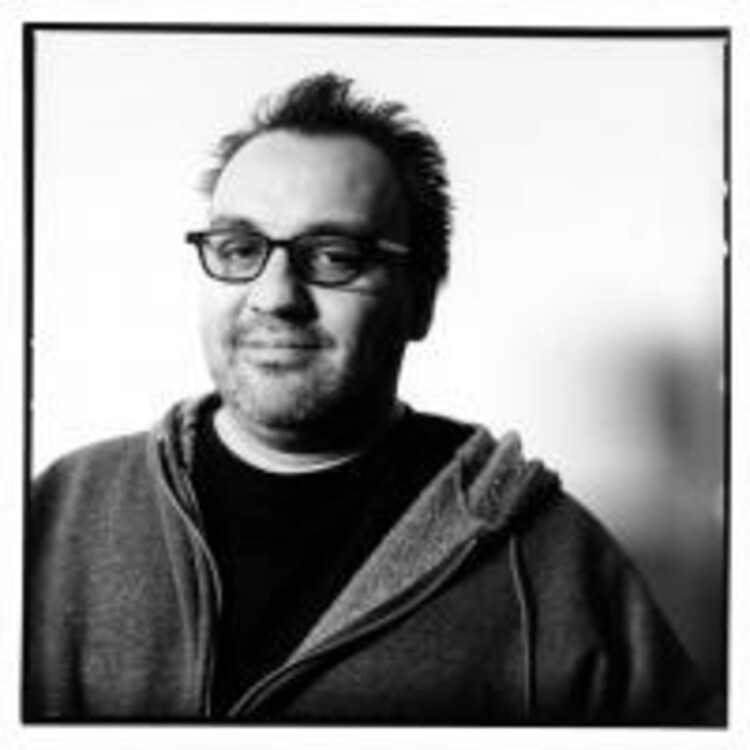
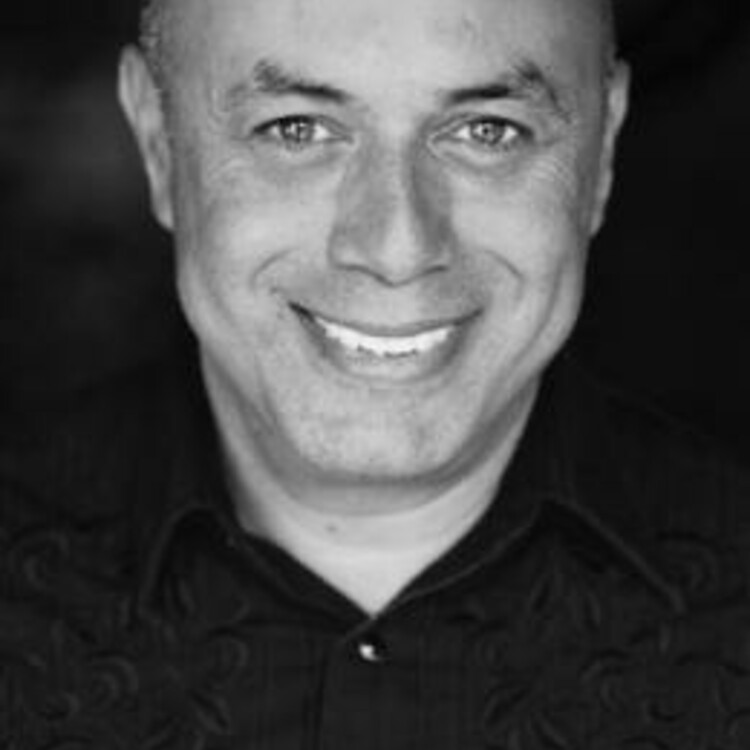
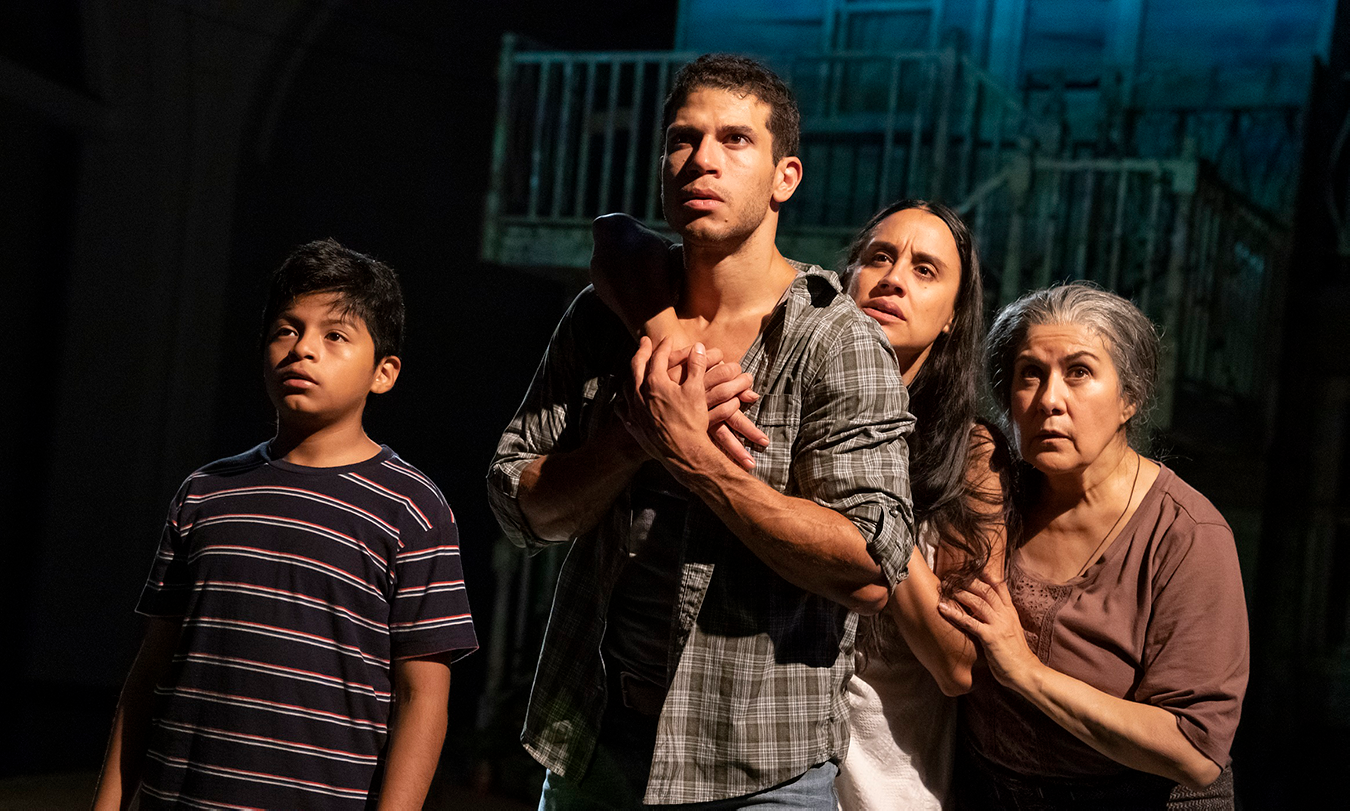

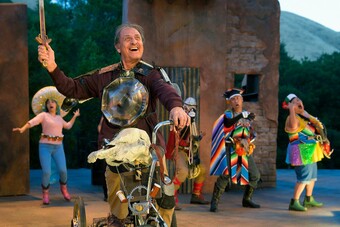



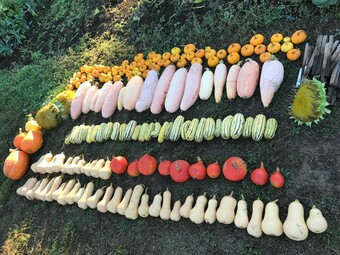

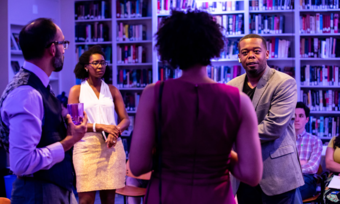


Comments
The article is just the start of the conversation—we want to know what you think about this subject, too! HowlRound is a space for knowledge-sharing, and we welcome spirited, thoughtful, and on-topic dialogue. Find our full comments policy here
I just want to say a huge thank you to both of you for this. I have followed both of your work from afar over the years, but generally seeing only the product. It's deeply helpful to get these insights into the context of your creative worlds and the institutions you are working with and within. Understanding that movement towards more participation and representation is complex, can contain many different people, and can happen in different ways is important for all of us who are trying to shift the way theaters (and our own thinking within them) work.
Thank you!